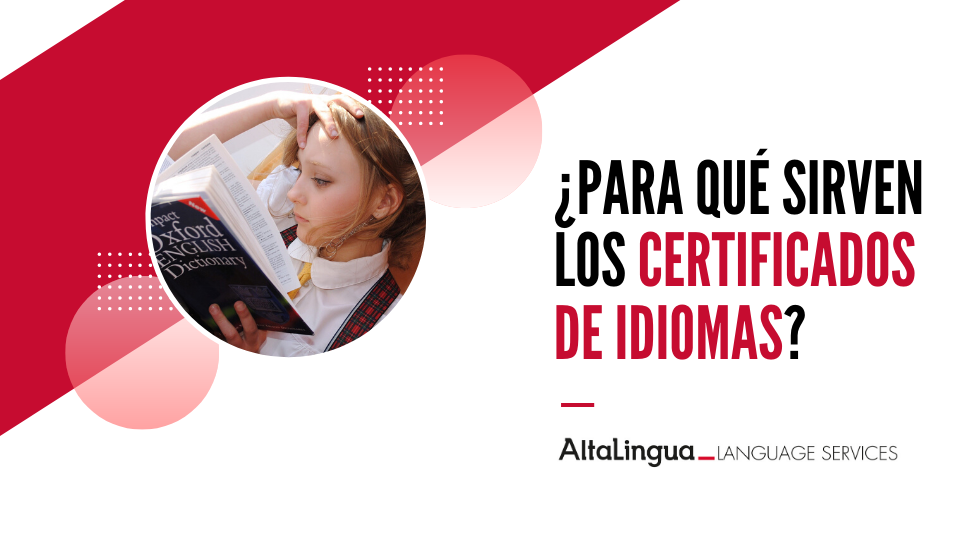-
Language Certificates
What are language certificates?
The language skills are an essential requirement to achieve professional success, but knowing it is not enough since you have to be able to prove it through through relevant language certificates.
The high demand for language skills implies the need to prove linguistic competences acquired through evaluative processes that involves carrying out different exams.
On many occasions, these official degrees are need to be translated in order to be able to present them to institutions that require it. Thus, that is why carrying out both simple and sworn translations at a translation agency will provide you the quality and legality suitable to the circumstances.
What are they for?
- Getting a university degree. One of the compulsory requirement at the majority of Spanish universities is the official proof of the level of English. Depending on the Autonomous Community in which you are you will asked for a B1 or B2 level to close your academic record.
- Leave Erasmus or do internships abroad. If your dream is to live a unique experience both academically and professionally in another country, you must have a suitable level of the language. Depending on the destination that you go to, you will be asked for proof of your language skills in order to be eligible for a scholarship or economic help.
- Increase job opportunities. It is of little use to put in your CV that you have language skills without proving them since you will have some languages tests to prove your level.Having an official proof with give you the possibility of passing, with greater ease,
- Increase benefits by Autonomous Community. If you are thinking of studying for a competitive exam, accessing job vacancies, getting transfers or others, having an official certified languages degree will give you more points to achieve your goal.
What language certificates exist?
Depending on the language different types of exams and certifications exist that certify the level obtained. Below we detail the levels according to the language (French, English and German) and the most important institution:
ENGLISH
A large variety of institutions exist that officially certify the language. The most well known is the University of Cambridge, which has four exams according to the level:
- Cambridge Preliminary English Test (PET) is the most basic level which evaluates the language proficiency in everyday situations with standard vocabulary. This level corresponds to a level B1 of the Common European Framework of Reference for Languages (MCER).
- Cambridge First Certificate of English (FCE) is the average level that is normally asked for to access any job or university. In it the comprehension of the language is more specifically evaluated in a way that you can hold a conversation with natives without any problem. This level corresponds to a level B2 of the Common European Framework of Reference for Languages (MCER).
- Cambridge Certificate in Advanced English (CAE) is one of the most advanced levels since it requires comprehension and fluency when it comes to reading a text or holding a conversation about more complicated topics. This level corresponds to a level C1 of the Common European Framework of Reference for Languages.
- Cambridge Certificate of Proficiency in English (CEP) is the expert level of the language. This level corresponds to a level C2 of the Common Framework
FRENCH
Various institutions also exist that officially certify the language. The most well known is the Ministry of Education that manages degrees:
- Diplôme d’Études en Langue Française (DELF) certifies A1, A2, B1 and B2 levels in which the same abilities are evaluated but they are adapted according to age.
- Diplôme Approfondi de Langue Française (DALF) certifies C1 and C2 levels and is aimed at adults.
GERMAN
The Goethe-Institut is the German cultural institution par excellence in charge of promoting the spread of the language and culture of the country. Additionally, it is in charge of preparing official German exams to obtain the certificate.
- Goethe-Zertifikat A1.It certifies the equivalent to level A1 of the MCER being the most basic. Two types of exam exist according the age of the person that carries out the exam.
- Goethe-Zertifikat A2. It certifies the equivalent to level A2 of the MCER and certifies some basic abilities of the language. Two types of exam also exist according the age of the person that carries out the exam.
- Goethe-Zertifikat B1.It certifies the equivalent to level B1 of the MCER and certifies a use of the language in everyday topics.
- Goethe-Zertifikat B2. It certifies the equivalent to level B2 of the MCER and certifies a more advanced use of the language.
- Goethe-Zertifikat C1. It certifies the equivalent to level C1 of the MCER and certifies some knowledge and skill sufficient for the use of the language in complicated topics.
- Goethe-Zertifikat C2 :Großes Deutsches Sprachdiplom (GDS). It certifies the equivalent to level C2 of the MCER and certifies possession of the most advanced level of the language.
AltaLingua
AltaLingua is a trusted name in the translation and interpreting sector and provides language solutions in all languages for clients across the world. https://altalingua.co.uk/
- altalingua@altalingua.co.uk
- Customer Area
